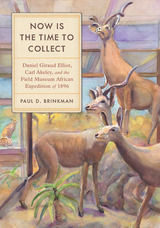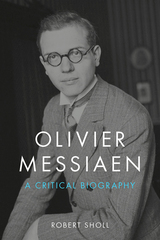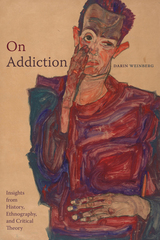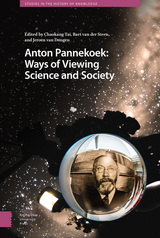

In Ways to Improve United States Foreign Educational Aid, Philip H. Coombs analyzes the recent experience of governmental and private educational aid to developing countries, examines the lessons derived from that experience, and suggests methods for improvements.
In Problems and Prospects of Education in Africa, Karl W. Bigelow provides an up-to-date survey and interpretation of the educational scene in British-related Africa describing the major problems facing that area, and speculates on probable future developments.
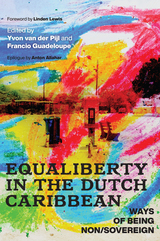
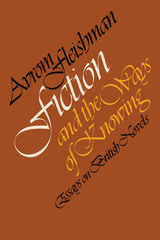
In this highly individual study, Avrom Fleishman explores a wide range of literary references to human culture—the culture of ideas, facts, and images. Each critical essay in Fiction and the Ways of Knowing takes up for sustained analysis a major British novel of the nineteenth or the twentieth century. The novels are analyzed in the light of social, historical, philosophical, and other perspectives that can be grouped under the human sciences.
The diversity of critical contexts in these thirteen essays is organized by Avrom Fleishman's governing belief in the interrelations of literature and other ways of interpreting the world. The underlying assumptions of this approach—as explained in his introductory essay—are that fiction is capable of encompassing even the most recondite facts and recalcitrant ideas; that fiction, though never a mirror of reality, is linked to realities and takes part in the real; and that a critical reading may be informed by scientific knowledge without reducing the literary work to a schematic formula.
Fleishman investigates the matters of fact and belief that make up the designated meanings, the intellectual contexts, and the speculative parallels in three types of novel. Some of the novels discussed make it clear that their authors are informed on matters beyond the nonspecialist's range; these essays help bridge this information gap. Other fictional works are only to be grasped in an awareness of the cultural lore tacitly distributed in their own time; a modern reader must make the effort to fathom their anachronisms. And other novels can be found to open passageways that their authors can only have glimpsed intuitively; these must be pursued with great caution but equal diligence.
The novels discussed include Little Dorrit, The Way We Live Now, Daniel Deronda, he Return of the Native, and The Magus. Also examined are Wuthering Heights, Vanity Fair, Northanger Abbey, To the Lighthouse, Under Western Eyes, Ulysses, and A Passage to India.
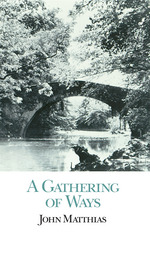

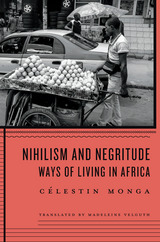
“A terrific meditation on contemporary African modernity, conceived through a series of essays that reflect on the practices of everyday life.” ―Kwame Anthony Appiah, New York University
There are two common ways of writing about Africa, says Célestin Monga. One way blames Africa’s ills on the continent’s history of exploitation and oppression. The other way blames Africans themselves for failing to rise above poisonous national prejudices and resentments. But patronizing caricatures that reduce Africans to either victims or slackers do not get us very far in understanding the complexities and paradoxes of Africa today.
A searching, often searing, meditation on ways of living in modern Africa, Nihilism and Negritude dispels the stereotypes that cloud how outsiders view the continent—and how Africans sometimes view themselves. In the role of a traveler-philosopher, Monga seeks to register “the picturesque absurdity of daily life” in his native Cameroon and across the continent. Whether navigating the chaotic choreography of street traffic or discoursing on the philosophy of café menus, he illuminates the patterns of reasoning behind everyday behaviors and offers new interpretations of what some observers have misunderstood as Africans’ resigned acceptance of suffering and violence.
Monga does not wish to revive Negritude, the once-influential movement that sought to identify and celebrate allegedly unique African values. Rather, he seeks to show how daily life and thought—witnessed in dance and music, sensual pleasure and bodily experience, faith and mourning—reflect a form of nihilism developed to cope with chaos, poverty, and oppression. This is not the nihilism of despair, Monga insists, but the determination to find meaning and even joy in a life that would otherwise seem absurd.

In Shaping Higher Education with Students, leading researchers and educators from a range of disciplines lay out practical steps for shaping research-based education. Written in collaboration with university students, the book encourages active partnerships between students and educators and offers an accessible guide to accomplishing this, including connecting students with real-world projects and workplaces, working with students as partners in higher education, encouraging students to pursue research activities that transcend disciplinary boundaries, and rethinking current assessment and teaching practices. Together, the contributions poses fundamental questions about the future of education in universities.
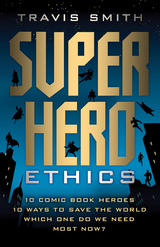
Although these outlandish figures—in their capes, masks, and tights, with their unbelievable origins and preternatural powers—are often dismissed as juvenile amusements, they really are profound metaphors for different approaches to shaping one’s character and facing the challenges of life.
But, given the choice, which superhero should we follow today? Who is most worthy of our admiration? Whose goals are most noble? Whose ethics should we strive to emulate?
To decide, Travis Smith takes ten top superheroes and pits them one against another, chapter by chapter. The hero who better exemplifies how we ought to live advances to the final round. By the end of the book, a single superhero emerges victorious and is crowned most exemplary for our times.
How, then, shall we live?
- How can we overcome our beastly nature and preserve our humanity? (The Hulk vs. Wolverine)
- How far can we rely on our willpower and imagination to improve the human condition? (Iron Man vs. Green Lantern)
- What limits must we observe when protecting our neighborhood from crime and corruption? (Batman vs. Spider-Man)
- Will the pursuit of an active life or a contemplative life bring us true fulfillment? (Captain America vs. Mr. Fantastic)
- Should we put our faith in proven tradition or in modern progress to achieve a harmonious society? (Thor vs. Superman)
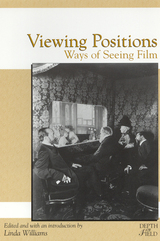
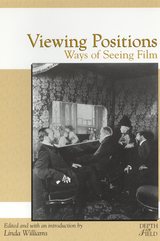

The Ways and Power of Love was originally published in 1954 when Pitirim Sorokin was in the twilight of his career and leading the Harvard Research Center in Creative Altruism. His elaborate scientific analysis of love with regard to its higher and lower forms, its causes and effects, its human and cosmic significance, and its core features constitutes the first study on this topic in world literature to date.
Sorokin was the one absolutely essential twentieth-century pioneer in the study of love at the interface of science and religion. Bringing The Ways and Power of Love back into print allows a new generation of readers to appreciate Sorokin's genius and to move forward with his endeavor at a time when civilization itself continues to be threatened by a marked inability to live up to the ideal of love for all humankind. It is certainly right to hope, with Sorokin, that progress in knowledge about love can move humanity forward to a better future. Turning the sciences toward the study of love is no easy task, but it can and must be done.
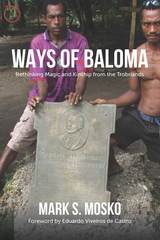
Informed by a synthesis of Strathern’s model of “dividual personhood” and Lévy-Bruhl’s theory of “participation,” Mosko upends a century of discussion and debate extending from Malinowski to anthropology’s other leading thinkers. His account of the intimate interdependencies of humans and spirits in the cosmic generation and coordination of “life” (momova) and “death” (kaliga) strikes at the nexus of anthropology’s received wisdom, and Ways of Baloma will inevitably lead practitioners and students to reflect anew on the discipline’s multifold theories of personhood, ritual agency, and sociality.
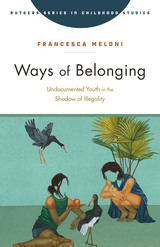
Drawing on long-term ethnographic fieldwork, Francesca Meloni shows how ambivalence shapes the lives of young people who are caught between the desire to belong and the impossibility of fully belonging. Meloni pays close attention to these young people’s struggles and hopes, showing us what it means to belong and to endure in contexts of social exclusion. Ways of Belonging reveals the opacities and failures of a system that excludes children from education and puts their lives in invisibility mode.
An interview with the author (https://www.qmul.ac.uk/clpn/news-views/book-interviews/items/interview-with-francesca-meloni-about-her-book-ways-of-belonging-undocumented-youth-in-the-shadow-of-illegality.html)
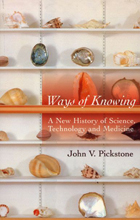
Covering an incredibly wide range of subjects, from minerals and machines to patients and pharmaceuticals, and from experimental physics to genetic engineering, Pickstone's Ways of Knowing challenges the reader to reexamine traditional conceptualizations of the history, philosophy, and social studies of science, technology, and medicine.

The religious persecution and intellectual intolerance of the sixteenth and seventeenth centuries compelled many heterodox groups and thinkers to resort to misdirection, hidden meaning, secrecy, and deceit. In this highly unusual interpretation, Perez Zagorin traces the theory and practice of religious leaders, philosophers, intellectuals, and men of letters who used deception to cloak dissident beliefs.
Zagorin surveys some of the chief sources of early modern doctrines of dissimulation in the Bible and the works of theologians from Jerome andAugustine to Erasmus, Luther, and Calvin. Subjects covered include Nicodemism, the name given by Calvin to secret Protestants who concealed their faith behind a facade of conformity to Catholic worship; crypto-Judaism in Spain; and the hidden beliefs of English Catholics. Other topics include the Catholic doctrine of mental reservation; the place of dissimulation in English Protestant casuistry; occultism; and dissimulation of religious unbelief among philosophers and men of letters. In charting the widespread phenomenon of lying and deceit and by exploring its evolutions, Perez Zagorin has made an important contribution to the historiography of an intellectually roiling and perilous time. He adds a vital dimension to our understanding of the religious, intellectual, and cultural history of the epoch before the modern. Lacey Baldwin Smith finds this hook “an impressive and scholarly work of cultural synthesis that coins a fresh label for the sixteenth and seventeenth centuries: the age of dissimulation. Zagorin’s efforts to compare and contrast Catholic and Protestant styles of dissimulation and Nicodemism are important, casting a new perspective and focus on the religious and intellectual dissent of the era.”
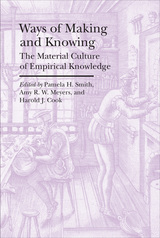
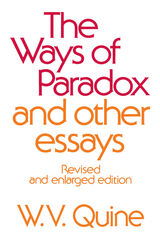
This expanded edition of The Ways of Paradox includes papers that are among Professor W. V. Quine’s most important and influential, such as “Truth by Convention,” “Carnap and Logical Truth,” “On Carnap’s Views on Ontology,” “The Scope and Language of Science,” and “Posits and Reality.” Many of these essays deal with unresolved issues of central interest to philosophers today. About half of them are addressed to “a wider public than philosophers.” The remainder are somewhat more professional and technical. This new edition of The Ways of Paradox contains eight essays that appeared after publication of the first edition, and it retains the seminal essays that must be read by anyone who seeks to master Quine’s philosophy.
Quine has been characterized, in The New York Review of Books, as “the most distinguished American recruit to logical empiricism, probably the contemporary American philosopher most admired in the profession, and an original philosophical thinker of the first rank.” His “philosophical innovations add up to a coherent theory of knowledge which he has for the most part constructed single-handed.” In The Ways of Paradox new generations of readers will gain access to this philosophy.

In 1962, Reiner Schürmann began studying at the Dominican school of theology Le Saulchoir, outside Paris. That experience radically shaped his life and work, enabling him to begin to develop many of the ideas for which he would later be known: letting be, life without why, ontological anarchy, and the tragic double bind.
Ways of Releasement contains never-before-published material from Schürmann’s early period as well as a report Schürmann wrote about his encounter with Heidegger; a précis of his autobiographical novel, Origins; and translations and new editions of later groundbreaking essays. Ways of Releasement concludes with an extensive afterword setting Schürmann’s writings in the context of his thinking and life.
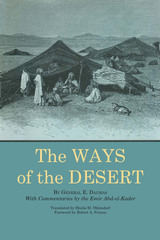
The Ways of the Desert, translated from the French, offers an introduction to the North African Arab nomads—their way of life, customs, dress, and religion. The companion to this volume, The Horses of the Sahara, provides a detailed description and history of the great breeds of Arab horses. While part of this book is devoted to descriptions of the various animals that are both hunted and used for hunting, its appeal goes well beyond its attraction for those with a special interest in the lore of desert hunt and chase. General Daumas and his major collaborator-informant, the Emir Abd-el-Kader, together provide sensitive insights into the total culture of the North African desert people of the nineteenth century.
Both spiritual and material aspects of desert life are encompassed in this work, which ranges from translations of Arab poetry to descriptions of the uses of the fat and remains of the ostrich. The patterns of conviction and conduct described form an important part of the rich cultural heritage of the modern Maghreb nations.
The way of life described in this book is often presented from what comes very close to being an inside point of view. Occasionally Daumas feels obliged to disapprove of certain practices or beliefs or to criticize his Arab friends, but in large part his underlying sympathy for the Arab people permits his informants to speak clearly through his pen.
General Melchior Joseph Eugene Daumas took part in the conquest of Algeria by France and, for his distinguished service, was named Director of the Bureau of Algerian Affairs in the French Ministry of War. During the campaigns and the occupation that followed, he studied and attempted to understand the native peoples with an objectivity and sympathy unusual among the colonialists of the period. He recorded a way of life that has changed much since the nineteenth century, and much of what he recorded has since been lost. His account, as well as being an important source for the historian and ethnographer, provides for the general reader a fascinating record of the vanishing ways of the desert.

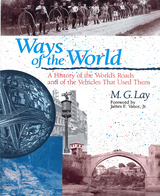
This is the first comprehensive history of the world's roads, highways, bridges, and the people and vehicles that traverse them, from prehistoric times to the present. Encyclopedic in its scope, fascinating in its details, Ways of the World is a unique work for reference and browsing. Maxwell Lay considers the myriad aspects of roads and their users: the earliest pathways, the rise of wheeled vehicles and animals to pull them, the development of surfaced roads, the motives for road and bridge building, and the rise of cars and their influence on roads, cities, and society. The work is amply illustrated, well indexed and cross-referenced, and includes a chronology of road history and a full bibliography.
It is indispensable for anyone interested in travel, history, geography, transportation, cars, or the history of technology.
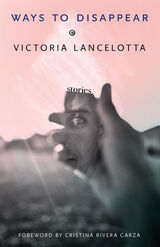
The stories in Victoria Lancelotta’s Ways to Disappear excavate the unexamined places between dread and desire, promise and threat, where the body is both prison and salvation. Populated by the grieving and the exultant and those who see no difference between the two, by men and women who are only a little bit broken and boys and girls who can’t wait to be, by souls untethered, rootless, yet bound by blood and flesh, Lancelotta’s characters are driven by the irresistible need to be a bigger part of the worlds they each inhabit, by turns strange and commonplace. In language lush and jagged, never sentimental, these stories scrutinize the exhaustion and enchantment of the everyday: houses seething with resentment and devotion, cars dream-full and hurtling the children in them into a world they think they know but can’t imagine; front porches, back yards, luxury hotels, and truck stops. Lancelotta understands that sometimes people check their wounds not to see if they’ve healed, but to be sure they’re still there.
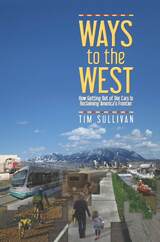
In Ways to the West, Tim Sullivan embarks on a car-less road trip through the Intermountain West, exploring how the region is taking on what may be its greatest challenge: sustainable transportation. Combining personal travel narrative, historical research, and his professional expertise in urban planning, Sullivan takes a critical yet optimistic and often humorous look at how contemporary Western cities are making themselves more hospitable to a life less centered on the personal vehicle.
The modern West was built by the automobile, but so much driving has jeopardized the West’s mystic hold on the American future. At first, automobility heightened the things that made the West great, but love became dependence, and dependence became addiction. Via his travels by bicycle, bus, and train through Las Vegas, Phoenix, Denver, Boise, Salt Lake City, and Portland, Sullivan captures the modern transportation evolution taking place across the region and the resulting ways in which contemporary Western communities are reinterpreting classic American values like mobility, opportunity, adventure, and freedom.
Finding a West created, lost, and reclaimed, Ways to the West will be of great interest to anyone curious about sustainable transportation and the history, geography, and culture of the American West.
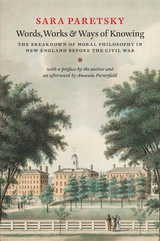
What’s less well-known is that before Paretsky began her writing career, she earned a PhD in history from the University of Chicago with a dissertation on moral philosophy and religion in New England in the early and mid-nineteenth century. Now, for the first time, fans of Paretsky can read that earliest work, Words, Works, and Ways of Knowing.
Paretsky here analyzes attempts by theologians at Andover Seminary, near Boston, to square and secure Calvinist religious beliefs with emerging knowledge from history and the sciences. She carefully shows how the open-minded scholasticism of these theologians paradoxically led to the weakening of their intellectual credibility as conventional religious belief structures became discredited, and how this failure then incited reactionary forces within Calvinism. That conflict between science and religion in the American past is of interest on its face, but it also sheds light on contemporary intellectual battles.
Rounding out the book, leading religious scholar Amanda Porterfield provides an afterword discussing where Paretsky’s work fits into the contemporary study of religion. And in a sobering—sometimes shocking—preface, Paretsky paints a picture of what it was like to be a female graduate student at the University of Chicago in the 1970s. A treat for Paretsky’s many fans, this book offers a glimpse of the development of the mind behind the mysteries.
READERS
Browse our collection.
PUBLISHERS
See BiblioVault's publisher services.
STUDENT SERVICES
Files for college accessibility offices.
UChicago Accessibility Resources
home | accessibility | search | about | contact us
BiblioVault ® 2001 - 2024
The University of Chicago Press


